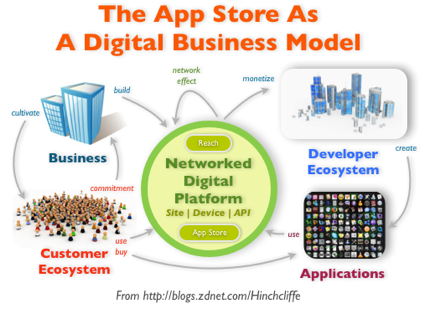The app store: The new "must-have" digital business model

Most of us will find app stores a very appealing model for getting the software we need safely while trying to get the most from our services and devices. Amazon announced today that it was opening up its Kindle reader device to 3rd party applications to be distributed later this year in the Kindle Store.
This news was just one more in a string of announcements from platform vendors large and small that they're getting the message: The app store model that Apple has proved so successfully with the iPhone is becoming the next frontier when it comes to next-generation software distribution. And it's one that creates clear value for both customers and companies alike.
The central idea is to help 3rd party developers build applications for a software platform and then get the results to customers, to everyone's mutual benefit. The idea itself is certainly far from new and goes back as long as there have been software platforms, which is pretty much since the beginning of computing. The big difference over the decades has been where the focus is in terms of encouraging 3rd party developers, controlling access to the platform, and who gets paid for delivering the software that runs on top of it.
Related: App stores aren't the only new 21st century digital business model.
Ultimately, most computing platforms ended up letting anyone who could write code develop applications, settling for one of the most important yet indirect benefits of platform ownership: A strong network effect that ensures a rich and vibrant ecosystem of developers, applications, and support was available for their customer's needs, whatever they might be.
But in today's vast and permanently wired computing world, completely unrestricted software development and distribution has become the leading target of the unscrupulous, whose worms, viruses, malware, and adware have become the plague of leading consumer and business computing platforms like Windows. With the Internet, anyone could distribute and charge for their own software, and they did, with little accountability. While these free wheeling distribution models of the open Web are great for those that want it, it gives the rest little choice.
Thus Apple's App Store -- despite the company becoming a notorious bottleneck for distribution (mostly for the approval process to ensure safe apps) -- has created a new exemplar for how to strategically wield control over a vast and effective new ecosystem of customers and software partners. With well in excess of 3 billion application downloads, over 100,000 applications, and ten million+ customers it's become a difficult example to refute. The app store model is now turning the heads of businesses looking to emulate something similar with their own platform, whether that is a Web site, network-enabled device, or even (perhaps especially) an open API.
Unboxing an App Store
An app store as it exists today is a distinctly different beast from modern direct-from-vendor downloads or 3rd party distributors. But what exactly makes an app store distinct from classical open software platforms and their open distribution model? There are several key attributes:
- Distribution and delivery controlled by the platform owner. Unlike Windows, Linux, or even the Blackberry, only organizations that have undergone a registration or vetting process get to distribute apps in an app store. This ensures accountability and additional safety to the customer. The vetting process can vary from a little oversight to in-depth corporate background checks. Delivery of the software is done through a controlled channel to the platform that the customer is using (again, to a Web site, device, or other channel) to ensure that applications are delivered safely from a trusted source that is free from interference and tampering. Updates are delivered the same way and a good app store will notify users when new updates are available using a centralized mechanism.
- A self-contained application directory and store. An app store itself may have a Web site or other external presence, but one of the most important features is that it's available right from inside the site or device itself. Apps can be loaded locally with little (or preferably no) external assistance or additional resources (like another computer) and wireless connectivity is preferred. The best app stores will reduce the effort to discover and download new applications to as simple a process as possible to ensure easy access to and uptake of applications.
- Centralized payment processing. Though many applications are freely distributed in app stores, if payment is required then the platform owner provides provides the payment processing. Though not all app stores will use centralized payment -- and some even don't let you charge (such as Facebook and their social applications) -- it's one of the best and most straightforward ways to gain economic value by being an intermediary between your customers, which you're offering access to via your app store, and those building successful applications. This is usually accomplished by charging a distribution fee as part of the payment. In the near future, expect to see additional monetization models offered by platform owners including advertising and subscription payments. Much of the potential economic benefits to platform providers and 3rd party application developers will be dependent on how effective the monetization models in an app store are.
- An application community to drive feedback and quality. In the rough and tumble world of fully open computing platforms, it's very hard to get a sense of how good a given application is on an objective scale. While app stores can't resolve this completely, an app store can (and in my opinion should) have a ratings and reviews component that lets any user provide their thoughts on the overall quality and capability of an application. This gives both the vendor and potential customers up-to-date information about an application from prior customers in a consistent way. This public feedback then gives the vendor a clear, customer-driven set of criteria to improve against and gives customers the information they need to determine if an application really meets their needs. I expect in the future that this will quickly become a standard expectation of app store buyers, just like ratings and reviews have in the e-commerce world.
App Stores: A Fad Or The Future?
From all this, it's pretty clear that the benefits of the app store model to platform owners is considerable both economically and from a control standpoint. Balancing this on the other side of the equation is the upfront investment and ongoing cost, which can be considerable. And, while an app store can amplify the overall effect of having ownership of a platform, they also put that business directly into the security, e-commerce, and customer service business, aspects that may be far outside of their core competence. Finally, getting an app store bootstrapped can be a challenge too: Businesses must be able to line up a critical mass of customers with enough compelling applications early on in order for an app store to have a good chance to succeed.
But even smaller app stores often see good levels of success. App stores from digital pen maker Livescribe, the Palm Pre, or the Nintendo Wii Virtual Console Store offer a decent selection that corresponds roughly to the size and style of their customer bases.
All of these issues will limit the number of companies that can release compelling offerings, at least until the app store infrastructure companies enter the scene to make the model accessible to a larger variety of companies. It's too bad the Web itself doesn't have an app store model, but that, like the implication for mashups, is a discussion for another post. So too will be the future of the largest and most interesting application markets, such as those for social networking applications including Facebook apps and OpenSocial. They might miss out the economic advantages that app stores can confer and therefore the investment and growth of 3rd party developers.
So, while app stores might seem at first like a major step backward for 3rd party application developers, it's not all bad news either. Though some regard the app store model as a disguised version of the hated "walled gardens" of the 1990s, it's clear that in this new world, the app developers and customers have a lot more control than ever before. That's not to say that they aren't naysayers of the model. Farhad Manjoo at Fast Company recently criticized the app store model, saying:
In the age of the Web, developers can get their programs to end users without anyone intervening, so locked-down software sales will always be going against the grain.
Unfortunately, as I discussed in my recent exploration of the latest online application models, the Web just can't do what mobile devices can do. Native mobile apps are actually one of the few real threats to the modern Web, despite their dependence on it. This is a tension that's going to build over the next few years as mobile devices become a dominant mediation point with the Web and app stores are just another example of this.
Related: How the Web OS has begun to reshape IT and business.
The key point here for customers and software developers is that the app store brings trust, security, and convenience, something that the Web so often lacks in the end. Most of us will find app stores a very appealing model for getting the software we need safely while trying to get the most from our services and devices. For companies that find themselves owning a platform that can support 3rd party apps, most had better do a close look at their offerings to see if an app store is a good strategic choice for them to create additional economic value and more satisfied customers. I believe a good number of them will find the answer in the affirmative.
Update: ChannelWeb's Steven Burke is a bit more sanguine about the app store model and Amazon's chances of using it with the Kindle, in "Don't Bet Against An Amazon Kindle Apps Store Revolution".
Will app stores be a flash in the online pan or a widespread new way to distribute software? And, more importantly, will this drive an app store model for business software such as Salesforce's App Exchange?
